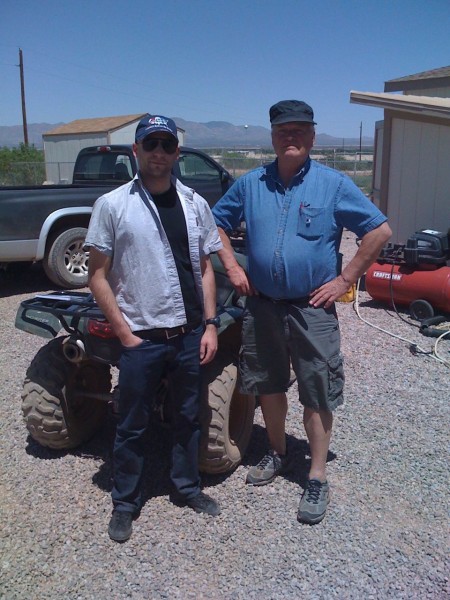
This article first appeared in Vice Magazine
![]()
It is a sweltering afternoon in May on a patch of empty Arizona desert straddling the US-Mexico border. There is not a soul in sight, no one to mind the cloud of dust Glenn Spencer kicks up as he brings his Hummer to an abrupt stop in front of a green shack the size of an industrial refrigerator. Spencer, cranky and impatient over the telephone, is in good spirits as he describes the inner workings of a sophisticated surveillance post that could be easily mistaken for a weather station.
“You don’t see any wires,” he says, pointing up. “We are completely off-the-grid.” Inside, a battery array feeds off the half-dozen solar panels mounted on the roof. The metal tower is topped with a thermal camera and an antenna that streams live video over the Internet via a command center a quarter mile away. The post, stationed no more than 30 feet inside the United States, is just a single node in an ambitious surveillance project. Codenamed “Operation Virtual Vigilance,” its objective is to give patriot citizens across the country full control of a network of wireless, military-grade cameras streaming real-time footage of the Mexican border.
The project gets no money from the U.S. Border Patrol, DEA, NSA, or any of those other goons. As the “No Trespassing” signs make abundantly clear, this is private property. Out here, the government may be tolerated, but it is not much appreciated.
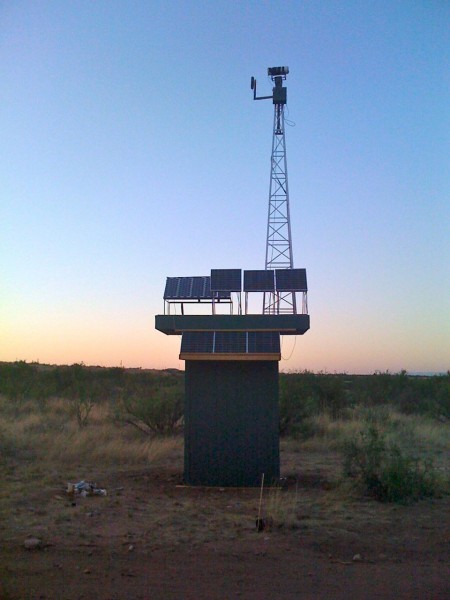
This land is fully under the authority of the American Border Patrol, an anti-immigration vigilante group who–unlike the notorious Minutemen project or any of the countless ragtag paramilitary groups running around the desert with assault rifles and walkie talkies–have realized the power of the internet over the M-16.
The American Border Patrol ranch occupies 104 sunburnt acres of flat, rocky Arizona desert, brushing up against a half-mile of Mexican border. The nearest town is miles away, there are no paved roads, and rattlesnakes and buzzards are the only neighbors. This is no man’s land, a natural trafficking corridor for people, drugs and money–a perfect place for a pitched battle with what the ABP sees as the forces of darkness.
The compound itself looks like all the other homesteads scattered across this wasteland: a few prefab buildings, gutted car carcasses, and piles of industrial junk scattered among the ravines and mesquite bushes. In a dry gully used as a shooting range there are hundreds of shattered bottles and beer cans shot full of holes, along with empty casings–9mm, Mauser and .223 Remington for the AR-15.
But no one is playing Rambo on this ranch when I’m there. They’re all too busy soldering circuit boards, tapping away at keyboards, or jury-rigging some sort of surveillance aircraft. ABP is not the only vigilante group using cameras to monitor the border, but it is by far the most sophisticated, way ahead of even the US Border Service.
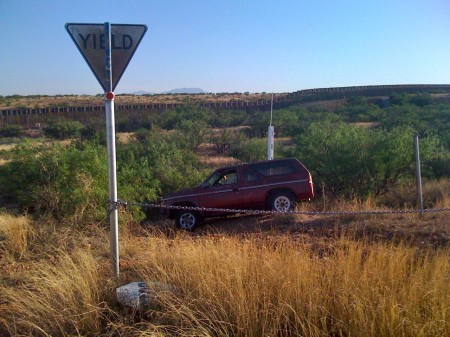
The whole operation is the brainchild of Glenn Spencer, a 71-year-old anti-immigration activist who moved out to Arizona to make a final stand against illegal border crossings. He bought this patch of land from a retired Army colonel who fled this place after a No Country For Old Men-style gun battle took place a few hundred yards from her home. It was a three-way gangbang: two Mexican drug-smuggling gangs and the US Border Patrol all duking it out in the middle of one of America’s busiest smuggling highways. So Spencer set up his outpost right in its path.
Haggard and beefy, Spencer looks every year of his age. A deep, crusted-over gash covers his right arm, a love-bite from one of the seven massive German Shepherds that keep him company. But he is energetic well beyond his wizened appearance, at times bordering on manic. As we make a wide loop around the ranch, Spencer tells me his life story.
He started American Border Patrol seven years ago after retiring from a lucrative career as a military think-tank analyst and oil prospector, trading in the chance of a slow and cushy death aided by golf and bingo for the life of a border vigilante. He also gave up his wife and his daughters, who broke off all contact with the man after he moved to the desert. “We’re on different sides of the issue,” he told me. But it might have less to do with the issue than his decision to sink his entire life savings into this high-tech security dream.

Glenn Spencer points to that border fence you always hear about
Some praise Spencer, but few understand him and most just hate the old coot. The Southern Poverty Law Center lists American Border Patrol as a hate group for the organization’s rhetoric and virulent anti-Mexican activism, referring to Spencer as the “Paul Revere of the anti-immigration movement.” They aren’t the only ones.
Spencer hates the Southern Poverty Law Center in turn, and says he holds no big grudges against other races. “My daughters have a nice life. They’re married to two nice Jewish boys,” he tells me, an obvious yid. The next words out of his mouth are literally, “Hey, some of my best friends are Jewish.” The Mexicans, however, aren’t quite as lucky.
Spencer is a Hollywood native, a child of 30s. “I went to Hollywood High. When I was growing up, Hollywood was not like it is today. It was just like the Bible Belt,” he says, as he pulls up to his house. Spencer was born right into the entertainment industry. His uncle was one of the founding members of Sons of the Pioneers, a popular country music group that scored many of John Wayne’s films, and his dad wrote music for the group. While at Hollywood High, Spencer dated Jane Novis, Helen Hunt’s mother, picking her up in the morning and driving her to school in his green 1947 Plymouth 2-door sedan. He worked as an usher at the Paramount theater and knew Harrison Ford when he was a carpenter. “I remember him when he made cabinets.” Yes, those were days.
The white and Protestant America he cherished has been under stealth attack from illegal immigration.
Spencer doesn’t just view the demise of the WASPy American values of his youth as simple encroachment of immigrants on traditional American culture and language. To him this is a real war, a slow, decades-long invasion planned at the highest levels of the Mexican government to recapture California, Texas, and as much of the Southwest as possible. He lays the blame for a host of contemporary social ills squarely on the influx of Mexican people–everything from LA’s Rodney King riots to meth addiction. Spencer firmly believes in “La Reconquista” and is determined to do something about it.
Spencer hands me a beer and leads me on a tour of his double-wide prefab house pad. He lives a grimly simple life. Though he has a four-bedroom house to himself, his workstation takes up half of his master bedroom. There is no line separating his personal time from his work. The shades are perpetually drawn. On his bedstand is a Kindle 2 sitting atop a silver 17-inch MacBook Pro. “I am an early adopter because I want to support emerging technology,” he says.

Inside the surveillance RV
On a huge glass table, two Mac towers and a handful of PCs whirr, powering half a dozen flat-panel displays. One of the displays is monitoring the Operation Virtual Vigilance surveillance system. Final Cut Pro stretches across a dual-monitor setup, another display has a massive Excel spreadsheet plotting latitude/longitude coordinates to video frame numbers. Google Earth is sitting open in another. A TV tuned to CNBC is on mute. It is sitting on a Tivo box that allows Spencer to grab relevant news clips and throw them on his American Border Patrol’s website. On the opposite side of the desk is a high-output DVD burner and two color printers. As Nathan Barely would put, ABP is a “self-facilitating media node.”
A 71-year-old man using the most up-to-date tech and gadgetry is not something you see everyday. But Spencer doesn’t think his dedication to technology is anything unusual. “Look, I’ve been working with computers my whole life. This isn’t something new to me.” In the living room, an Apple LISA II computer is proudly perched on a shelf for pure effect, like a nerd’s version of a Ming vase.
Out on his porch, it’s just about sundown and the whole scene is bathed in a golden light. A rooster struts around a chicken coop in one corner of the yard, and his herd of scary German shepherds lounge on the lawn, waiting for someone to play catch. A decorative waterfall in an artificial pond filled with goldfish and catfish provides the soothing musical backdrop. It’s pure serenity on the surface, but the desert isn’t for the weak or meek. One of the dogs is moping around the fenced-in lawn in a daze, still groggy from a rattlesnake bite right to its muzzle. Another one has an ugly looking gash on its belly. Spencer isn’t sure, but he thinks it was mauled by a bobcat prowling in the night.
Of course, it’s not the wild cats that have people here reaching for their guns at night. Living in the path of one of America’s most active smuggling corridors puts the ABP in direct conflict with pissed-off drug smugglers and desperate illegal immigrants lost in the desert wilderness. About a year ago, a couple of drug smugglers tried to be reasonable with the ABP. They didn’t try to shut down their surveillance project or to put Spencer on his knees and stick a gun in his mouth. All they asked was that the ABP look the other way from time to time, and be nicely compensated for it.

They asked and asked, but only got rejections. And after a while, they finally stopped asking. Then one day, two of Spencer’s ATVs mysteriously burst into flames a few minutes after revving up. Ever since, people around the ranch have taken precautions. ABP’s main carpenter puts on a flak jacket whenever he goes out to repair the camera towers. “I don’t want someone taking shots at me from across the border.” No one’s ever taken potshots at him, but disoriented illegal crossers have knocked on the door of the guest house in which he lives. Most of the time they were spooked and dehydrated. “One time there was a group of people, around ten. Most of them were just kids. They were scared and hungry,” he says. So he gave them water and food while they waited for U.S. Border Patrol to arrive and haul them off to some Department of Homeland Security dungeon. That’s some American tough love for ya.
The ABP wasn’t always the technological juggernaut it is today. “We started out with groups of twenty or so doing foot patrols along the border. You could be out for two, three days and never see a thing,” explained Spencer as we toured the ranch, passing a camo-painted pickup truck equipped with a pneumatic telescoping camera mount. “That’s when we decided to use technology.”
Over the next seven years, hundreds of thousands of dollars in donations and $1 million of Spencer’s own cash was poured into ABP, transforming it from a ragtag vigilante group into a high-tech surveillance operation that pushed the boundaries of civilian technology, reconfiguring off-the-shelf products into surveillance tools as effectively as those used by better-funded government agencies.
Towers topped with solar panels and cameras rise above the desert like LEGO giraffes. An RV stands in one corner of the ranch. Instead of a sewage connection, a tangle of wires and Ethernet cables spews out its side. There’s a 32-inch LCD TV and a computer monitor set up inside, but it isn’t for entertaining visiting in-laws. It’s a mobile command center for a pair of unmanned aerial drones hanging in the nearby aluminum hanger, just one part of a comprehensive surveillance system ABP had been working on since 2002.

As soon as Spencer moved out here, he assembled a crack team of do-it-yourself engineers to make his vision a reality. They rigged a grid of seismic sensors that monitored the ranch for the tell-tale vibrations of foot traffic. They experimented with mobile camera units that streamed live surveillance video over the Internet via a satellite dish and generator tacked onto a trailer. ABP tried and succeeded in embarrassing the Border Patrol while McCain was taking a tour of a local station by spotting a huge group of illegal immigrants crossing the border right under their noses. Years before the Border Patrol purchased a fleet of Predator drones, ABP had two UAVs equipped with daytime and infrared cameras making periodic sweeps of the border. The drones – dubbed “Night Hawks” – used an autopilot program ABP wrote in-house from scratch. It allowed the UAVs to hook into the seismic grid below, allowing them to follow a preprogrammed flight path until motion was detected, at which point they would veer off to capture the event on film. Once there’s visual confirmation, Border Patrol agents are alerted with precise GPS coordinates.
ABP’s videos of brazen border crossings by large groups of people contributed to increased activism by anti-immigration groups, just as Spencer had hoped it would. The Border Hawks even got the attention of the US Army, which sent a team of engineers to observe them in action. ABP began licensing its autopilot software back to the drone manufacturer. But in the summer of 2005, an earthen damn burst twenty miles up the San Pedro River, which flanks the ABP ranch. The river overflowed it banks, washing away most of APB’s seismic sensors. A year later, ABP had to abandon its seismic grid altogether when the FAA grounded their UAVs. The Border Hawks’ navigation system violated flight regulations, which ban unmanned aerial vehicles from operating out of visual range.
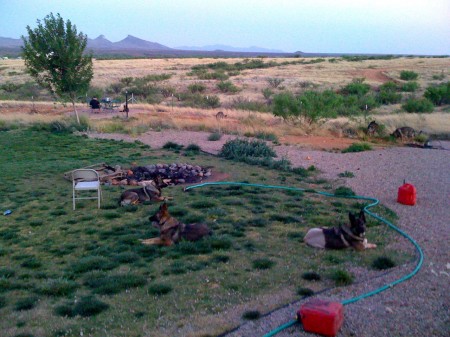
In March of 2008, ABP finally launched their most ambitious, game-changing project: “Operation Virtual Vigilance.” The project was designed to allow Americans angry about illegal immigration to help stop unlawful border crossings without leaving their stateside living rooms.
While Spencer is out in the yard playing with his dogs, blasting classical music into the void of the desert like a thicker, older Robert Duvall in Apocalypse Now, I’m sitting in his office on the phone with Bob Parker, a retired Coast Guard pilot and the unofficial commander of ABP’s virtual-volunteer army. Sitting in his air-conditioned den, he can monitor the Arizona border simply by logging into the Operation Virtual Vigilance website. As I sat at Spencer’s desk, Parker talked me through my first remote-control border surveillance session.
First I call up the video feed for one of the thermal cameras located in the north-east section. A black-and-white image of a river bed lined with stunted trees appears on my screen, framed to one side by a section of border fence bolstered with Normandy-style vehicle barriers. The infrared camera shows the hot metal bars of the barriers as glowing white Xs against the deep black of the cool desert floor.
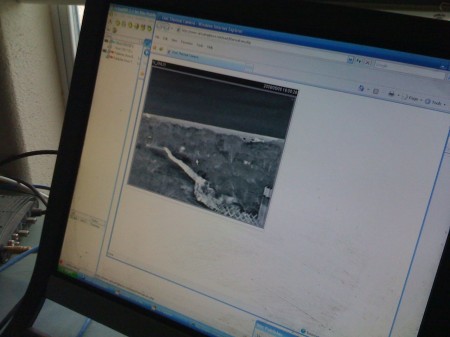
Tonight, the desert is quiet. “See the white squares in the right-hand corner, right below the horizon?” Parker asks over the phone. “That used to be John Wayne’s ranch. It’s on the Mexican side of the border. It’s been taken over by drug smugglers. They have a bright bar of light they turn on in hopes of blinding the camera.” But it doesn’t work. The camera picks up the infrared band of the spectrum, not visible light. Moving through the frame, Parker points out the dark gullies dotted with white foliage that are used for cover by illegal immigrants, or “SBIs” (“Suspected Border Infiltrators”) in ABP jargon. The US Border Patrol has a cruder name, calling them “bodies.”
I quickly discover that high-tech border-watching can get as dull as watching the security cameras in a mall cop’s booth. But it’s also surprisingly difficult finding moving human beings in these crude infrared images. Parker explains that if you want to spot SBIs, you have to watch certain kinds of terrain, like the gaps between trees and the few flat open spaces. He points out a white spot on the edge of the border road. Some critter urinated there no more than a few minutes ago, he says–probably a human, most likely a Border Patrol agent.
Parker is a master at reading these infrared images. He claims that he played a role in the apprehension of roughly 1,500 SBIs in the first six months that ABP’s Virtual Vigilance project was up. He’s also helped intercept five drug loads. The number sounds unreal, but “We got most of it on tape,” he insists. Indeed, Spencer’s office is lined with shelves holding hundreds of mini-DV cassettes.
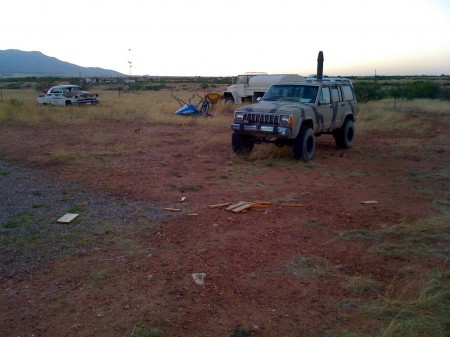
And the footage does not lie. Clips, shot with their high-resolution thermal imaging camera, show groups of 10 to 50 people crossing the border at a time. Facial features don’t make it into a thermal image, but the video feed is clear enough to read body language and distinguish between males and females. Many of the silent trekkers seem young, teenagers at most. Every one carries a backpack. Some pick at branches as they shuffle along wearily. It looks like a particularly crappy backpacking trip.
“I had seven border patrol agents on horseback. Ten on the ground walking and a helicopter out there,” recounts Parker in a cool military tone, bringing back the scary reality of the scene. It was eerily reminiscent of the footage from drones circling above the desert of Afghanistan, moments before a missile slams into frame. All of a sudden, the line of people stops in unison, frozen for a few moments before “quailing”–border lingo for scattering in different directions.
Ever since Operation Virtual Vigilance went online a year ago, Parker has been coordinating a network of two dozen volunteers–a middle-aged woman in Philadelphia, an Illinois computer programmer, an expatriate living in Thailand–who would sign up to monitor the group’s three cameras in thirty-minute blocks. He trains new recruits, providing a 45-minute crash course in video surveillance: showing them how to pan, zoom and adjust gain using the system’s web-based interface, and pointing out the dark gullies and dense shrubs where illegal immigrants tend to hide. He also teaches them how to use Google Earth to navigate the landscape and pinpoint a suspect’s precise position. Volunteers call him with reports of suspicious activity, which he calls in to Border Patrol.
“To me this is Star Trek technology,” he says, “If only we had this stuff when I was in the Coast Guard.” In the two decades that Parker spent looking for smugglers off the coast of Texas and Florida in a standard-issue Albatross airplane, he had nothing more advanced than binoculars at his disposal.
As we watch the video feed and talk about how cool the documentary Cocaine Cowboys is, Parker recounts some highlights from his career chasing drug smugglers in the 80s and 90s. “Once we were chasing a DC-6 plane in our Albatross, and the DC-6 started dumping their cargo out the back,” he chuckles. “The guys were just pushing bales and bales of marijuana out of the plane and into the water. And then they called it out on the CB radio, and everyone and their mother was out on their boats picking it up.” The smugglers had pulled a fast one on the law, again.
The government has spent huge amounts of money trying, and so far failing, to do what ABP has done on a shoestring. In 2005, the Department of Homeland Security awarded Boeing a contract to develop a “virtual fence” prototype along a 28-mile stretch of border in Arizona. Dubbed SBInet–Secure Border Initiative–it was meant to replace the outdated CCTV-style surveillance network currently in use by the US Borer Patrol (a system so inefficient that only 1 percent of alarms led to arrests). On paper, SBInet’s specs were similar to Operation Virtual Vigilance, just minus the public access.
But something went terribly wrong. While ABP was already testing a functional beta version of their “fence,” Boeing still had yet to produce a working SBInet prototype. The project’s budget started off at $20 million, but had ballooned to nearly $1 billion two years later. In late 2008, while Operation Virtual Vigilance continued to build its volunteer base and rack up hundreds of successful assists with just three cameras, the Department of Homeland Security announced that it was scrapping SBInet. Its motion-detecting radar system was triggered by rain, satellite connections were too slow for operators to follow moving targets, and cameras had poor image quality.
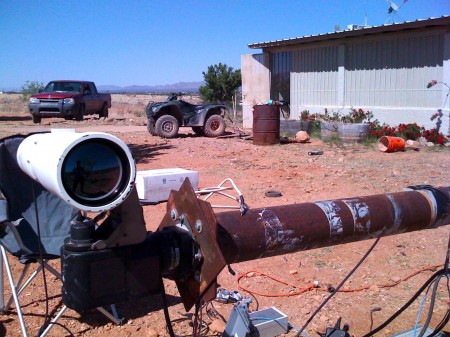
“SBI? I call it Strategic Bullshit Initiative,” scowls Spencer. ABP already knew about many of the problems Boeing had run into, including the satellite link bandwidth problem. Spencer says he even attempted to arrange a meeting through his military contacts. No meeting ever took place. But this was good PR for ABP, proof that top-heavy tech dinosaurs from the era of IMB’s fridge-sized floppy drive had no business in the age of distributed Internet power.
Competing with lame government rivals and fueled by Spencer’s fierce energy and technical skill, Operation Virtual Vigilance seemed like a sure thing to go viral with the huge, deeply frustrated anti-immigration crowd. Until Virtual Vigilance came along, an angry patriot’s only option was to stew in his own juices or grab a gun and head for the border. Operation Virtual Vigilance provided an outlet for non-violent activism. It was a video game with a purpose. The volunteer base has grown, but not at anything close to the exponential rate its founder had hoped for. Spencer blames this on a national media blackout of anything related to the American Border Patrol. Spencer blames the blackout in turn on the media’s corporate ownership, which he says has a vested interest in protecting the supply of cheap immigrant labor. “They don’t want people to know what we are doing because they don’t want people to donate money to us,” he says.
For all his talk about battling illegal immigration, Spencer seems more invested in toying with newer and cooler surveillance gadgets, and proving his visionary ideas can work, than in the cause itself.
Spencer already has a new project to keep him busy. Outside his home, workers are clearing and leveling a rocky patch of desert for a private runway to launch ABP’s latest surveillance gadget: an ultra-light plane fitted with a thermal-imaging camera that will allow Spencer to track illegal crossings miles from his ranch while soaring soundlessly through the sky. He hopes to organize Arizona’s ultra-light community into an air-borne posse. At 71, Spencer has taken to the air, and left the ground war to younger troops.
POSTSCRIPT: I visited the ABP ranch in May. In June, two weeks after I finished the article, Glenn Spencer was embroiled in a nasty hate crime. An FBI team tracked Shawna Forde, a 41-year-old female Minutemen member suspected of murdering a Hispanic man and his 9-year-old daughter as part of a robbery scheme to shore up money for militant anti-immigration operations, to Spencer’s property. She was arrested at a roadblock as she left the ranch. At the time, her connection to the murder was not made public. According to Spencer, he had no idea of Forde’s involvement in the crime and had broken off all contact with her and the Minutemen, saying that she arrived without advance warning and only stayed for 20 minutes. Did Spencer offer his ranch as a hideout? Fuck if I know, but Shawna Forde had been seen at the ABP ranch before. Just goes to show how sick and twisted America’s anti-immigration movement can be.
Yasha Levine is a McMansion inhabitin’ editor of The eXiled. He is currently stationed in Victorville, CA. You can reach him at levine [at] exiledonline.com.
Read more: american border patrol, arizona, glenn spencer, illegals, mexico, us border patrol, Yasha Levine, Dispatch


Got something to say to us? Then send us a letter.
Want us to stick around? Donate to The eXiled.
Twitter twerps can follow us at twitter.com/exiledonline















32 Comments
Add your own1. Henirich Muggins | August 8th, 2009 at 6:57 am
Yeah, the anti-immigration movement is “sick and twisted.” Let’s import an under-class to lower our wages. Let’s empower the cleptocrats in cities like Chicago with the votes of this imported under-class. Let’s just open the borders and let those nice drug and human smugglers into the country. They are such nice people. In case you didn’t notice, I am being sarcastic.
2. az | August 8th, 2009 at 8:29 am
Yeah instead let’s outsource everything to Mexico and China and then complain about low wages.
3. geo8rge | August 8th, 2009 at 8:46 am
There seem to be many unrelated groups using the minutemen name. Sort of the the Muslim “Party of God” or Hizballah. The original minutemen (Started my Gilchrist) did not take any action and were made fun of for retreating from event he most feeble illegal alien encounters. Their mistake was not trademarking their name as copy cats, some insane, attempted to do similar things ‘their way’.
If the charges leveled at Ms Forde are true I suspect she was an opportunist who saw a way of using the chaos on the US border to further a criminal enterprise. The anti immigrant groups were just a way to gain access to the border area.
The whole thing is stupid though. The immigrants will come as long as they are permitted to work in the US. And the US economy is strong. These border groups don’t quite understand that is the problem.
4. Sin Fronteras | August 8th, 2009 at 8:50 am
“Let’s import an under-class to lower our wages.”
Or we could organize an international labor movement to combat the constintraion of global capital in to fewer and fewer hands. No. That would take a lot of work and foresight. And it would take all the fun out of being racist bastards.
“Let’s empower the cleptocrats in cities like Chicago with the votes of this imported under-class.”
Or we could revolt against bourgeois democracy and get rid of classes all together. No. That would take a lot of work and foresight. And it would take all the fun out of being racist bastards.
“Let’s just open the borders and let those nice drug and human smugglers into the country. They are such nice people.”
Or we could legalize the drug trade, and pull the rug out from the prison industrial complex. Focus on honestly educating people about the effects of drug use and let them make their own choices. Maybe work to make our day to day lives less alienating, and alleviate the desire to self medicate a little? No. That would take a lot of work and foresight. And it would take all the fun out of being racist bastards.
“In case you didn’t notice, I am being sarcastic.”
No shit?
5. Sin Fronteras | August 8th, 2009 at 8:52 am
constintraion* should have been concentration
6. captain america | August 8th, 2009 at 9:20 am
@without borders.
legalizing drugs? good. educating people about the dangers of drugs? good luck with that, kiddo. worldwide marxist revolution? well, i think it’s a bad idea, but then, what did you expect?
7. Timmy | August 8th, 2009 at 11:09 am
I think Spencer’s notion of this as a war is realistic. Stalin loved to shuffle around populations to break up troublesome groups.
Same with the British Empire. Any delibarate mass import of humans contrary to the wishes of the resident population is an act of war.
8. Gaucho | August 8th, 2009 at 11:57 am
If there ever was a group competent enough, organized enough and motivated enough to lead a political revolution in America, these are the guys.
Sorry if you don’t like how they want to run things.
9. jack | August 8th, 2009 at 1:57 pm
Jewish bankers are scull-f@cking the country and the patriots are shooting up Mexicans.
Like doing colonoscopy to treat brain cancer.
10. Sin Fronteras | August 8th, 2009 at 3:20 pm
@8, They can be the front line in a political revolution, that is fine with me.
“23. Use liberals as human shields and conservatives as ballistic cover”
11. Timmy | August 8th, 2009 at 5:55 pm
>>Use liberals as human shields and >>conservatives as ballistic cover
Lol, I like the moxy in the above sentiments, but I don’t know if I support an international marxist revolution – it seems like in the past it tapped into the same sort of vulnerablilities as rapture christianity (ie replace jesus’s kingdom with worker’s paradise and the skeazy ministers with ghoulish and powerhungry revolutionaries). Don’t forget, the good folk at goldman sachs are the same gang who were big in the marxist revolution schtick.
Thanks for bringing up that old Jewish Question Jack, I think it’s important to note that Ames, a jew, is doing a very important job in exposing Goldman Sachs. Much as it wouldn’t be totally fair to blame every anglo saxon for Bush and Co, it’s not really fair to blame every jew for Goldman Sachs. Just apply the law with full force to every corrupt elite shit and then let the chips fall where they may – everyone should be able to support that.
12. Heinrich Muggins | August 8th, 2009 at 8:55 pm
@ w/o Borders: Nice job on throwing the racist baby out with the anti-immigration bath water.
Nil desperandum, your side has already won the battle. The liberals have eliminated any middle ground between xenophobia/racist opposition to immigration and open borders. Since most decent White people don’t like being called racists, they are afraid to air their true feelings about this issue. I, however, am neither White, nor decent.
13. adolphhitler | August 8th, 2009 at 9:23 pm
@11….ames is a jew?
14. Trigger | August 8th, 2009 at 9:26 pm
“…[Spencer’s] uncle was one of the founding members of Sons of the Pioneers, a popular country music group that scored many of John Wayne’s films. . . .”
You outta your mind, rookie? The uncle did minimal work with Wayne, but he and his amigos cranked 45 oaters with Roy ‘Gay Ranchero, Mi Caballero’ Rogers.
Do your homework.
15. az | August 8th, 2009 at 9:47 pm
Timmy: In the end it’s either Marxist socialism, the capitalism we have now, or the third-way idealist capitalisms like fascism, libertarianism, etc.
Let me be the first to say that fascism has much more in common with libertarianism than communist ideology. Both rely on fantasy. Fascism of Europe in its romanticist image of the 19th century and before and libertarianism of its physiocrat ideals of rights together with the inherent inability to bridge the philosophies of rationalism and empiricism. Both have an inherent and unconditional love for the state. Fascism loves it for its perceived strength and purity and libertarianism while hating the government, too love the strength of the state in enforcing property relations and its complete legal purity at the basic level (the constitution). Of course, even though they choose to ignore it, libertarians do, or if they succeed, will realize that such a state can only be a dictatorship to survive. Similarly, both fascism and libertarianism hate class conflict and unions, but fascism has utilized it to ‘optimize’ capitalism and to minimize class struggle via concession or redirection (public works, xenophobia, racism, even some welfare), something the libertarians would realize sooner or later, if not already (they do in other countries not dominated by the rubbish of producerism, on the welfare bit).
So gentlemen, you might ask then, what is libertarianism anyway? Why it is nothing but fascism without executive experience! Thank you, thank you. I hope this helps understand that when the road of our capitalist system, with all its faults comes to a fork, we can either go left to communist revolution or right and eventually back to a romantic yet pointless third-way fascism of one kind or another.
16. aleke | August 9th, 2009 at 3:12 pm
We need rationalism. And if you think communism played on the people in the same way religions does, no shit? They’re finding more and more evidence to suggest religion is quite a natural phenomenon, with some evidence suggesting genes themselves. What needs to be done is a co-option of religion to be turned into rationalism. The same rationalism of Plato, Marx, the Enlightenment, the muslim Arabian mathematicians, on and on.
Irrational nihilism is stupid. Rational nihilism is a redundancy. All we have in this positively-charged void is an empirical and rational way to expose all of what we can understand, and aggregate this information to serve us. Or we can go into the irrational Social Darwinism of the free market or the irrational, mystical obscurantism of fascism. May as well renounce gravity and throw all of our rational tools into the ocean, god knows they’ll be welcome with all the hundreds of millions of tons of plastic swirling around the North Pacific Gyre.
Either stand up and walk like a rationalist man, or go back to nomadic hunter gathering. There is no inbetween. If you’re interested in moderate liberalism or centrism, look at what havoc industrialization has wrought.
17. aleke | August 9th, 2009 at 3:16 pm
Oh and stop obfuscating liberalism with leftism and rationality.
18. az | August 9th, 2009 at 4:56 pm
Aleke: I suggest then you read about philosophy in general, empiricism, rationalism, and a man named Immanuel Kant and beyond, and not on Wikipedia. It would clear up some misconceptions.
19. aleke | August 9th, 2009 at 5:56 pm
Hahahah ahahahhaha like what
20. Sin Fronteras | August 9th, 2009 at 6:22 pm
@16 “4. Never defend a fixed position”
21. Rick | August 9th, 2009 at 6:39 pm
Not sure whether to give Levine points or not for respect/disrespect. It’s pretty goofy to devote your late-life to this. It’s almost like taking a religious journey, late in life, only it’s like a xenophobic Hajj.
That Robert Wright “Evolution of God” book is spectacular, except Robert Wright is way too fundamentally respectful of humanity to recognize what a fucking hilarious story he’s telling.
All the modern evolutionary religious guys basically reflect Mencken’s correct account of the birth of religion, except nobody’s allowed to write like Mencken anymore:
http://bit.ly/ZavA3
That’s a great book. It’s not filled with overzealous misanthropy, just the logical amount, for the tale being told.
But I’d beware enshrining “rationality.” It’s cool as a literary character: Sherlock Holmes, Mr. Spock. Everybody engaged in any enterprise is ostensibly striving to do the reasonable thing at any one moment, but religious sentiments are rather well walled-off. I dunno.
22. LIExpressway | August 9th, 2009 at 7:03 pm
Do not worry your hearts ye wrathful white men, for the brown man shall soon leave your homelands in vast numbers by no choice but there own, despite your own mighty efforts. The brown man will look to your lands once full of plenty filled with the the spirit of freedom and see only ignorance and decline. They will finally endeavor not to make the thousand mile journey to your shit hole, not because of the many dangers you have unleashed upon them through your vengeful wrath but because you have nothing.
And it is upon that moment that you and your fat assed brethren will then truly be in a world of steaming shit, and you will mourn the loss of those far off days when the brown man envied you and your bountiful lands.
23. adolphhitler | August 9th, 2009 at 7:08 pm
yasha…i saw your picture with glenn spencer and i gotta say, you are one fine jewish specimen of a man…i’m jealous, but oh well, doesn’t matter, either way I’m fucked…in your posts i have listened to you lament you not getting laid and i have offered advice as to how to meet women in the greater victorville area …however, having seen your picture i hereby declare that you obviously are not doing it because you choose not to. as for me, all hope is lost…I will probably never get laid again in my entire life or if i do i will only fuck fat chicks who look like eric cartman…but that is ok as i live in rancho cucamanga. but still i can see in the last 30 days that you have indeed morphed into a true victorville local…congratulations!
24. az | August 9th, 2009 at 8:25 pm
@19: Like anything, hell even Bertrand Russell’s ‘History of Western Philosophy’ would do, otherwise your post @16 is just confusing because you don’t know what you’re talking about and reeks of pseudo-intellectualism because you think you do.
25. adolphhitler | August 10th, 2009 at 8:21 am
dear yasha @ 23…touche my friend
26. aleke | August 10th, 2009 at 1:44 pm
@24
Thanks for your silly and deliberately vague rebuke ya Beigist, liberal soft-head.
@20
I’ll give in wholeheartedly to Anarchism when it stops worshiping the Fascism of the Image and allowing authoritarians to rule their cliques under the misleading guise of equality and freedom of expression. Not to say that I’m not sympathetic to Anarchism, I am.
27. Sin Fronteras | August 10th, 2009 at 5:26 pm
@26, And so we come full circle.
“I like your Christ, I do not like your Christians. Your Christians are so unlike your Christ.” – Mahatma Gandhi
“The problem with anarchism is that Anarchists are fucking mental defectives.” ATHA motto.
http://www.youtube.com/watch?v=h_tidL_SkAQ
28. Fors | August 10th, 2009 at 8:46 pm
I like the Yasha articles. I like ’em a lot.
29. mika | August 11th, 2009 at 2:29 pm
If jobs/opportunities weren’t available, illegals wouldn’t be coming over here.
If Spencer and others like him want to battle illegal immigration, they should go all the way and spend at least an equal amount of time and resources finding out who’s *hiring* those illegals, instead of hiring some nice poor god-fearin’ white Americans that need work.
If you don’t have a pot to piss in and nothing to lose, you’ll try and go somewhere where you can have said pot as well as a couple of dollars an hour picking strawberries.
As for communism, capitalism, rationality, who cares, no system will ever work long-term and all will fall apart eventually, because people are inherently fucked up and always will be.
30. Sin Fronteras | August 11th, 2009 at 4:51 pm
“People are inherently fucked up and always will be” this I know, for the Bible tells me so.
31. mika | August 13th, 2009 at 1:22 pm
Actually, Sin, I’m an atheist. I’d rather think of the human race as yet another failing evolutionary experiment in progress. Species come and go, and we’re not going to be any different.
We’re like parasites, except parasites don’t pretend to be otherwise.
32. Russian chick | August 21st, 2009 at 4:40 am
Yasha looks suprisingly nice, this boring and rotten place hasn’t spoiled him:)
Leave a Comment
(Open to all. Comments can and will be censored at whim and without warning.)
Subscribe to the comments via RSS Feed